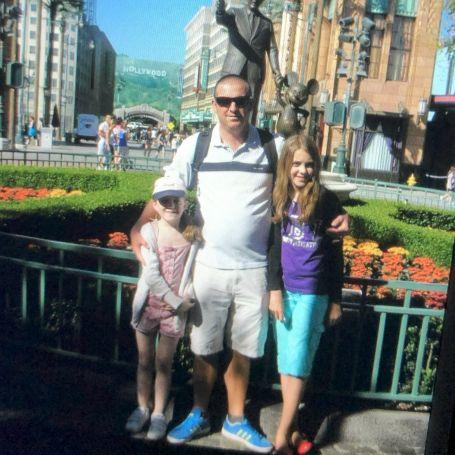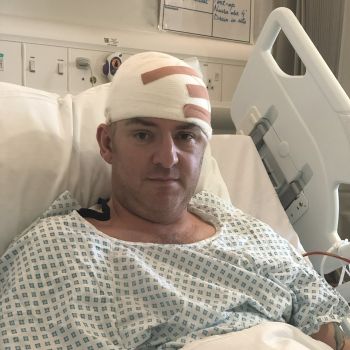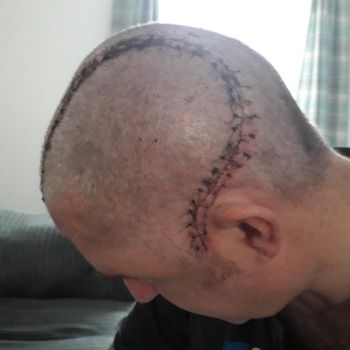14 Aug 2025

In October 2018, David Summerfield was at Waterloo Station when a man he didn’t know punched him in the head. The single blow threw David to the floor, hitting his head hard, causing his heart to stop.
Fortunately, an off-duty doctor was first to get to David and she immediately commenced CPR. The first London Ambulance Service (LAS) paramedic to arrive found David in a shockable rhythm and got his heart beating again. Working together with the other emergency services, London’s Air Ambulance advanced trauma team arrived on scene and provided hospital-level care to David at the station before taking him to hospital.
David suffered a severe traumatic brain injury: you can read more about his story here. These injuries are always life-changing and in an instant, throw your life into turmoil. Of course, the impact of the injury had an immeasurable effect on David, however when the worst day happens, it’s not just the individual whose life is changed – there is a huge ripple effect.
This piece shares the experience of Chloe and Jasmine – David’s two daughters – as they look back to how they navigated their dad’s traumatic injury. Unfortunately, there is no manual on how to cope or manage in such situations, but we hope that in sharing their lived experience, it will help and be of comfort to other families who may be going through something similar.
We were having a really good day
At the ages of 14 and 18, in the middle of school exams, Chloe and Jasmine were living their teenage lives like every other family. “We’d had the best day ever, a movie marathon all day long while both our parents were out,” said Jasmine, recollecting the day of the incident.
While the girls were at home, David’s incident occurred, resulting in his severe traumatic brain injury. That evening, the whole family, both as individuals and as a collective, experienced their world being turned upside down.
The moments after
A whirlwind struck the house, with the girls and their mum finding out about David’s incident from his mum, who arrived unexpectedly at the house at 10pm. The police then arrived to take the family to the hospital on blue lights.
Chloe suffers from anxiety and the unexpected events of the evening impacted her significantly. “Chloe didn’t want to go to the hospital,” explained Jasmine. “So, I stayed at home with her as I wasn’t going to leave her on her own. Mum and our nan went with the police.”
“I was struggling to come to terms with what had happened, as well as what was happening in that moment,” said Chloe. “I knew once I went, it would be real, so I think I was putting it off a bit.”
The girls stayed at home and waited for updates from their mum. It was a few days before they visited David in the hospital: “by then we knew he was going to survive. With it being less critical, it felt less scary to go and see him,” said Chloe.
Experiencing the hospital environment
“The only time we’d been to hospital that I had memory of was visiting my grandad, who was just old and not critically ill,” said Jasmine. “So, this was our first real experience of visiting someone special who was really unwell in hospital.
 “I think if I went back now, the smells and sounds would really trigger me.”
“I think if I went back now, the smells and sounds would really trigger me.”
David was at The Royal London Hospital in Whitechapel. “It was such a big hospital,” said Chloe. “It was overwhelming and scary – it was like how you see it on TV.’’
Many friends and family visited David during his months in hospital – which both the girls said they found comforting: a friendly face helped bring some normality into the foreign situation.
Remembering the first time they actually saw their dad, even seven years on from the incident, brought back emotion for both girls.
“I burst out crying as soon as I went in and saw him – it made it real,” said Jasmine. “I had no picture in my mind of what he would look like, then when I saw him, I was hit with the realisation that this had actually happened. It made me really emotional.”
One thing that Jasmine found helpful was the nurse’s explanation of what was happening and what they could see.
“That made it so much better. Mum hadn’t been able to explain everything and I think she also dialed it down.
“She didn’t want to scare us, whereas the nurse was honest with us – it was really nice to hear that honesty.”
Whilst David was in a coma, Julie, the girls’ mum and David’s wife would speak to him, however Chloe didn’t feel comfortable doing that. “I felt really silly doing it, I didn’t like it,” she said. “Our dad is a big man and seeing him lying down with bruised eyes, a sunken head, wires everywhere – it would have been scary seeing anyone like that, but especially our dad who had been my rock up until that point.
“For me, sitting and talking to him at that stage was not helpful.”
The personal struggles experienced
The transition from strong, reliable parent who is always there, to vulnerable parent who requires care, is always a difficult hurdle for many families to accept and process.
“I had never seen my dad cry, he was the big strong typical dad figure in our lives,” said Jasmine. “Then to see him so vulnerable – that was what made me so upset.”
Chloe continued: “I also knew he wouldn’t like everyone having to cater to him. Knowing he would be annoyed by that upset me too.”
 At the age of 14, Chloe struggled to find a peer who could understand or empathise with what she was going through. “My friends didn’t really get what was happening, so they couldn’t really be there for me. It was hard – not having support from friends, not much going on at home as everyone was busy and of course not having my dad there either.”
At the age of 14, Chloe struggled to find a peer who could understand or empathise with what she was going through. “My friends didn’t really get what was happening, so they couldn’t really be there for me. It was hard – not having support from friends, not much going on at home as everyone was busy and of course not having my dad there either.”
Both girls were in the middle of exams at school and Julie was of course visiting David and supporting him as best she could.
Jasmine said: “We were trying to be at school as much as we could for our exams. But then it was really weird coming home and the house being empty with everyone away at the hospital.”
As well as the obvious traumas that come with an incident like this, there are the unexpected personal details that can cause distress, which vary from person to person.
“One of the hardest things for me,” said Jasmine, “was when I would go up to bed and Dad and Mum’s bedroom door was still open. Dad is a greenkeeper and so he’d go to bed by 7pm to be able to get up at 3am the next day.
“The bedroom door being open in the evening was the weirdest thing. It was those little things that were so traumatic for me.”
Once David was able to leave The Royal London Hospital, he began months of neuro rehabilitation. The majority of this time David was in the stroke ward.
“He was the youngest by far in the unit and Dad found it so tricky,” said Jasmine. “And because he found it hard, we found it really tough.
“It was really hard to leave him when you were visiting, because you knew he didn’t want to be there.”
Chloe echoed: “I didn’t want to miss out on too much school and fall behind, that made me so anxious. It was hard juggling visits with GCSEs.”
However, looking back at what helped them get through, Jasmine said “what was a constant help was watching things get better. For example, initially the bruising around his eyes really scared me, but every time we went back, it had gone down a little, which made it more comfortable each time. It was better seeing him get better.”
The recurring theme of guilt
“The biggest challenge for me was doing normal things,” said Jasmine. “About two weeks after the incident, we had a big social party at school that I had helped organise through the planning committee. But when it came around, I felt so guilty going.
“I knew that was ridiculous and I knew Dad would want me to go. I also knew that if the incident hadn’t happened, I wouldn’t have been seeing Dad that day anyway, but that didn’t stop the guilt.
“Going out and having a nice time, while he was laying in a hospital bed, I just felt so guilty doing it.”
Chloe also identified guilt as a common feeling throughout this time. “I didn’t know how to manage my emotions very well and because I’d never experienced anything like that before, I was struggling to come to terms with what I was feeling.

“Even going to bed and watching YouTube – I felt like I shouldn’t be laughing at a funny video, that made me feel guilty.”
When reflecting on the night of the incident, Chloe feels the theme of guilt again.
“Still to this day, I feel guilty about not going to the hospital on that first night. One of my biggest regrets is not going straightaway, but in the moment, I just couldn’t think of anything worse than going.
“I didn’t realise how bad it was until after, when they said that that could have been our only chance to say goodbye. I felt really guilty that I didn’t go and because I didn’t go Jasmine didn’t.”
Whereas Jasmine’s account is different: “I feel the opposite, I’m really glad we didn’t go. It all turned out okay in the end.
“Seeing Dad a week later was as traumatic as it was – I know if we’d been on that first night it would have been even worse.”
Offering advice to another
In sharing their lived experience, Chloe and Jasmine hope they will be able to support someone else – another child, daughter or sister – who may be sadly navigating the impact of trauma. In doing so, they also share some personal advice they wish they’d had access to.
“It’s never going to be a good situation if you’re in a situation like this,” said Chloe, “but I would say try to find someone to relate to.
“I didn’t have anyone who could tell me how to cope with school and I struggled because none of my friends had experienced something like this. I would have liked someone my age, who had gone through it and got through the other side.”
Knowing the impact shared experience can have and as part of London’s Air Ambulance Charity’s aftercare support, we put The Summerfields in touch with another family, whose dad had also gone through an incredibly similar incident.
“Speaking to their daughter, who was my age, I felt so good. It was brilliant being able to tell her how I had coped and how I managed,” said Jasmine.
“Dad also found this helpful, connecting with someone who had gone through the same. And Mum loved it. She’s best friends with the other man’s wife now, they’re always comparing and sharing recovery tips and experiences.
“It’s just nice knowing other people have gone through the same thing and been okay.”
Jasmine also has some practical advice: “Ask every question you can think of. At the beginning, I was worried some of my questions were silly, but no question is too silly and everyone is happy to answer your questions.

“I wrote a diary every day and I wrote questions I had at the back – someone will have the answers you need.
“I also wrote what I had done each day Dad was in a coma. Then I actually gave it to him a few months into his recovery – telling him what we did and where we went. He got a little emotional reading it, but it’s definitely something I would recommend doing.
“It’s good to read back through and see what you went through, and that you’re out the other side.
“Sometimes you can’t think about what’s in your head, there’s so many emotions going on, but writing them down on a piece of paper can be your way to splurge everything out. For Chloe especially as she doesn’t like to talk!”
Chloe said: “My advice is not to bottle things up, which is definitely what I did. I pushed my emotions aside so I could try to be there for others, which obviously is not very healthy and affected me more in the long run. I think that’s partly why I’m so anxious now. My advice is to talk no matter how difficult it is in the moment. Going through therapy now is so freeing, which I never thought it would be. So, talking and writing is imperative when you’re going through something like this.”
Living life now
Now, the family of four are back living full lives, with David back to work, watching West Ham and winding up the girls as he used to.
“Our relationships are all back to normal, Dad is back,” said Jasmine. “But I do think it took a couple of years, for a while we did feel like he wasn’t the same dad we had from before the accident.

“In terms of how we’ve changed, I do have anxiety when he goes out to London with his friends, when any of us do really. But we’ve learnt to keep each other in the loop with what we’re doing.”
Chloe said: “Dad goes through phases where he’ll remember what happened and he’ll take Mum on a little holiday and appreciate life a little more. Then other days he’s back in his old ways and just watching sport all day – which is so nice as that’s who he was before.
“He was never an angry person, but I was worried when he woke up, he would be angry, as the clinicians had warned that could be the case. But he wasn’t, it was more frustration I think - which you could completely understand.”
Before David’s incident, the family hadn’t heard of London’s Air Ambulance Charity before – “it’s weird to think the service who helped our dad is a charity!”
“Now, we do so much to try and support them,” said Chloe.
“They’ve always been so important, but you don’t realise until they’ve helped you and someone you know.”
If you or your family are navigating a traumatic injury, we hope Chloe’s and Jasmine’s reflections have helped you feel that you’re not alone. We have more resources and shared experiences on our website which you’re welcome to read and use if helpful.

